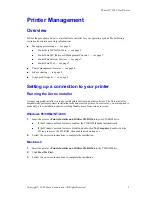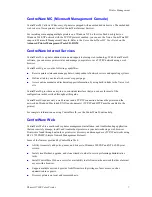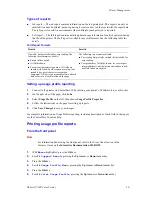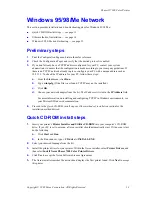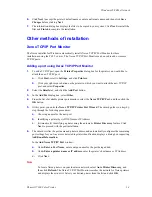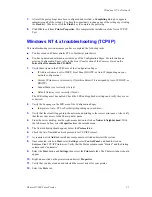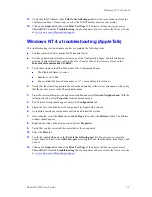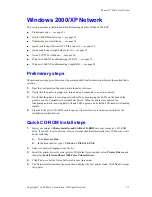
Windows 95/98/Me Network
Phaser® 7300 Color Printer
15
7.
After all the port settings have been configured and verified, a
Completing
dialog box appears
summarizing all of the settings. You have the opportunity to change any of the settings by clicking
the
Back
key. Otherwise, click the
Finish
key to complete the port setup.
8.
Click
OK
to exit from
Printer Properties
. This completes the installation of the Xerox TCP/IP
Port.
PhaserPort software
Note
PhaserPort is the preferred utility for PostScript installations. For PCL installations, see the
section
Xerox TCP/IP Port Monitor
.
The Xerox installer for Windows automatically installs PhaserPort for Windows (for those installations
using PostScript drivers). PhaserPort for Windows is a Xerox print monitor for printing over
Windows 95/98/Me TCP/IP peer-to-peer networks.
Changing a PhaserPort IP address
If the IP address of the printer is changed, change the IP address of the corresponding port:
1.
From the
Start
menu, select
Settings
, then click
Printers
.
2.
In the
Printers
window, right-mouse click your printer, then click
Properties
.
3.
In the
Properties
dialog, click
Details
.
4.
Verify that PhaserPort appears in the
Print to the following port
field and click
Port Settings
.
5.
In the
Configure PhaserPort
dialog, enter the correct IP address or DNS name for the printer. If
you don’t know the printer’s IP address or DNS name, click
Browse
to display a list of printers on
the network. Double-click the printer you want; PhaserPort automatically enters the information
into the
Configure PhaserPort
dialog. To search the network again, click
Refresh
; to expand the
search to other subnets, click
Advanced
.
6.
Click
OK
.
7.
Click
OK
again to apply the changes.
Windows 95/98/Me troubleshooting
This troubleshooting section assumes you have completed the following tasks:
You have a basic operating knowledge of your Windows version.
You have loaded a Phaser printer PCL or PostScript print driver.
You have printed and retained a current copy of the Configuration Pages. For information on using
the front panel or printing Configuration Pages, refer to the
Front Panel
section of the
Features Guide
on the
Interactive Documentation CD-ROM
.
1.
Verify that the printer is plugged in, turned on, and connected to an active network.
2.
Verify that the printer is receiving network traffic by monitoring the LED’s on the back of the
printer or on the CentreDirect External Print Server. When the printer is connected to a
functioning network receiving traffic, its link LED is green, and its traffic LED (amber) is flashing
rapidly.





